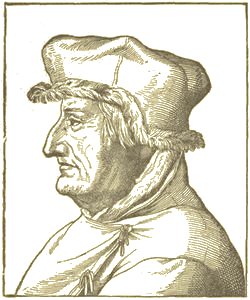 Nicolaus Copernicus, born on February 19, 1473, in Toruń, Poland, was a Renaissance-era polymath who revolutionized the field of astronomy with his heliocentric theory, which posited that the Sun, rather than the Earth, was the center of the universe. This groundbreaking idea laid the foundation for modern astronomy and significantly altered humanity's understanding of its place in the cosmos.
Nicolaus Copernicus, born on February 19, 1473, in Toruń, Poland, was a Renaissance-era polymath who revolutionized the field of astronomy with his heliocentric theory, which posited that the Sun, rather than the Earth, was the center of the universe. This groundbreaking idea laid the foundation for modern astronomy and significantly altered humanity's understanding of its place in the cosmos.
 Copernicus was well-educated, studying mathematics, astronomy, and the sciences at the University of Krakow. He furthered his studies in Italy at the universities of Bologna, Padua, and Ferrara, where he also earned degrees in canon law. His academic background equipped him with the knowledge and tools necessary to challenge the geocentric model of the universe, which had been widely accepted since the time of Ptolemy.
Copernicus was well-educated, studying mathematics, astronomy, and the sciences at the University of Krakow. He furthered his studies in Italy at the universities of Bologna, Padua, and Ferrara, where he also earned degrees in canon law. His academic background equipped him with the knowledge and tools necessary to challenge the geocentric model of the universe, which had been widely accepted since the time of Ptolemy.
Copernicus' major work, De revolutionibus orbium coelestium (On the Revolutions of the Celestial Spheres), was published in 1543, the year of his death. In this seminal book, Copernicus outlined his heliocentric theory, arguing that the Earth and other planets orbit the Sun. This model contrasted sharply with the prevailing Ptolemaic system, which placed the Earth at the center of the universe and was supported by the Catholic Church.
Despite its revolutionary implications, Copernicus' heliocentric theory initially met with skepticism and resistance. The idea that the Earth was not the center of the universe challenged deeply held beliefs and required a fundamental rethinking of the cosmos. However, over time, the Copernican model gained acceptance, especially after being supported and expanded upon by later astronomers like Johannes Kepler and Galileo Galilei.
Copernicus' work laid the groundwork for the Scientific Revolution, transforming the study of astronomy and influencing a wide range of scientific disciplines. His insistence on observation and mathematical precision set new standards for scientific inquiry, paving the way for future discoveries. Nicolaus Copernicus remains a towering figure in the history of science, remembered for his courage to question established doctrines and his contributions to our understanding of the universe. |
 Nicolaus Copernicus, born on February 19, 1473, in Toruń, Poland, was a Renaissance-era polymath who revolutionized the field of astronomy with his heliocentric theory, which posited that the Sun, rather than the Earth, was the center of the universe. This groundbreaking idea laid the foundation for modern astronomy and significantly altered humanity's understanding of its place in the cosmos.
Nicolaus Copernicus, born on February 19, 1473, in Toruń, Poland, was a Renaissance-era polymath who revolutionized the field of astronomy with his heliocentric theory, which posited that the Sun, rather than the Earth, was the center of the universe. This groundbreaking idea laid the foundation for modern astronomy and significantly altered humanity's understanding of its place in the cosmos.  Copernicus was well-educated, studying mathematics, astronomy, and the sciences at the University of Krakow. He furthered his studies in Italy at the universities of Bologna, Padua, and Ferrara, where he also earned degrees in canon law. His academic background equipped him with the knowledge and tools necessary to challenge the geocentric model of the universe, which had been widely accepted since the time of Ptolemy.
Copernicus was well-educated, studying mathematics, astronomy, and the sciences at the University of Krakow. He furthered his studies in Italy at the universities of Bologna, Padua, and Ferrara, where he also earned degrees in canon law. His academic background equipped him with the knowledge and tools necessary to challenge the geocentric model of the universe, which had been widely accepted since the time of Ptolemy.








